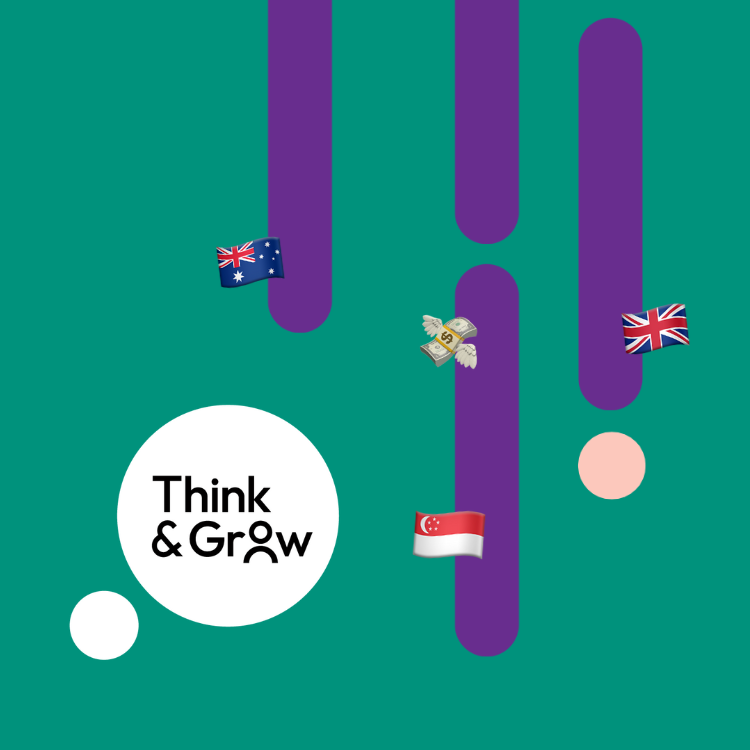Based in Tel Aviv, we’ve been working with Gonen for a while in our role as Bringg’s Australian Ambassador. Gonen is former co-sell program leader under the Alliances group at Bringg. He established Bringg’s Ambassador Program, a unique co-sell motion, accelerating global pipeline generation and deal conversion from end-to-end, making it a key revenue stream for the company. Gonen is experienced in consultative sales and industry research, having worked with business consultancies, software integrators, and industry experts enabling enterprises to take advantage of Bringg’s Delivery Orchestration platform. In his current role, Gonen is VP of Business Development at 1MRobotics, a stealth startup in the e-commerce nano fulfillment logistics space.
In a conversation with Think & Grow Partner Hugo Bieber, Gonen shares his advice and strategy when building partnerships for international expansion, advice that will be highly relevant for Australian companies looking to expand globally.
Hugo: What makes partnerships so powerful as part of an international expansion strategy for businesses?
Gonen: Partnerships are key to any business that's looking to expand beyond their own capacity or their own limits. Partnerships serve a key role when it comes to the multiplier effect, amplifying your voice to external parties, enabling you to form deeper relationships through the existing relationships of the partner. Not to mention, enabling you to expand your voice when you are not physically present within a specific geography or region meaning partnerships are key in enabling such growth.
Hugo: You launched Bringg’s partnership programme. What are market factors that drove you to initiate the programme?
Gonen: Generally speaking, any company that is traversing its growth journey, reaches a phase where its sales team is stable, rather large and is able to communicate the value proposition of the company in an efficient way. But, you also reach a point where you are limited by your own capacity.
When you reach that stage or when you want to penetrate the new market, you might not necessarily have the best market practice when it comes to expanding beyond your own borders. To do that, having a local player who is the market expert, who knows the market trends, who is able to facilitate such connections, is the most important thing.
Hugo: Is there a stage where you have a very strong partnerships programme, and then it almost sort of filters down again, as the company gets to the next stage size-wise?
Gonen: It's definitely a matter of company maturity and growth. For early stage companies, I would advise focusing on referral partnerships, where the partner is not strictly intertwined into their own sales journey and process. As they are going through the ropes, still defining their own criteria, such as their threshold for what consists of a sales target.
Once they reach a point of maturity with their own functions in place such as sales, marketing, engineering and support, you can enable co-selling. Co-selling is when a partner is deeply rooted in your own sales cycle, working alongside you in the sales process. Later down the line, you can outsource or enable the partner to be a full reseller - handing them the keys for them to represent the company.
Hugo: How did you set-up your first partnership programme?
Gonen: There were a few elements that we had to take into consideration when we launched the partnership programme for the first time. This included defining the following:
- Partner profile and identifying design partners.
- The compensation structure around the programme.
- Methodologies for the enablement of the partners
- The rules of engagement between the partner sales team and management.
For example, we knew that for Bringg, the regions we’d focus on had to be where we already had active sales teams. We’re very hands-on and like to have everyone in the loop so we can create a rinse and repeat scenario.
Hugo: What makes an excellent partner?
Gonen: Transparency between the two sides is key for a truly successful partnership:
- Provide the full picture to the partner so they know where you’re limited from day one. For example, let them know if you’re not ready to be working as part of a reseller partnership, but when you might expect to be.
- Being transparent also means externalising your data. Ideally, have a PRM (partner relationship management) system in place, so you're able to externalise to the partner a real-time dashboard showing them where they stand with their active engagements.
- Being respectful. If you botch things or drop the ball just be upfront about it. And of course, make amends if necessary. At the end of the day, ups and downs are expected when building a partnership.
Hugo: For Australian companies reaching a certain level, what advice would you give them in terms of using partnerships as a vehicle for growth?
Gonen: It comes back to the overall rule of thumb that I mentioned earlier. When it comes to the different companies’ stages in their growth lifecycle, this can also be applied to the Australian landscape.
The most important thing is some sort of qualification or semi-due diligence when looking for a trusted partner to collaborate with. This is to ensure it makes sense to form a partnership.
Questions to ask to make sure you’re both a good fit include:
- What’s your speciality?
- Where are the synergies?
- What can you tell me about your past experience working with similar companies?
- How have you helped companies expand outside Australian borders or nationally?
- Who are the current players you’re working with?
- Do you already have some relationships with my competitors? If so, please elaborate.
This qualification is key for both sides.
-----
If you're a business looking to expand internationally to Australia or abroad, get in touch for a chat to see how we can help!
.png)
.png)


.png)